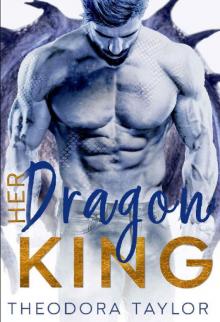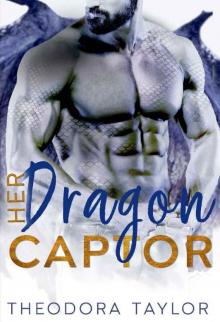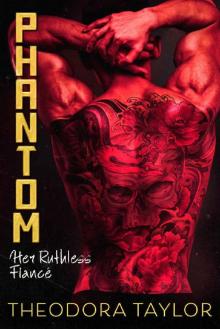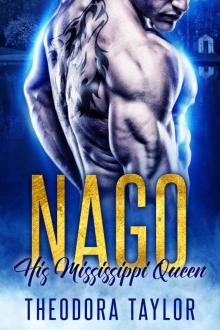 Her Dragon King (Her Dragon King Duet Book 2): 50 Loving States, North Dakota Pt. 2
Her Dragon King (Her Dragon King Duet Book 2): 50 Loving States, North Dakota Pt. 2 HAN: Her Ruthless Mistake: 50 Loving States, Delaware (Ruthless Triad Book 4)
HAN: Her Ruthless Mistake: 50 Loving States, Delaware (Ruthless Triad Book 4)![Billie and the Russian Beast: An Enemies to Lovers Russian Hockey Player Sports Romance [50 Loving States, South Carolina] (QUARANTALES Book 2) Read online](//i1.bookreadfree.com/04/billie_and_the_russian_beast_an_enemies_to_lovers_russ50_loving_states_south_carolina_quarantales_book_2_preview.jpg) Billie and the Russian Beast: An Enemies to Lovers Russian Hockey Player Sports Romance [50 Loving States, South Carolina] (QUARANTALES Book 2)
Billie and the Russian Beast: An Enemies to Lovers Russian Hockey Player Sports Romance [50 Loving States, South Carolina] (QUARANTALES Book 2) The Brothers Nightwolf Complete Trilogy: A Sci-Fi Shifter Paranormal Romance Box Set
The Brothers Nightwolf Complete Trilogy: A Sci-Fi Shifter Paranormal Romance Box Set Kel D'Rek; His To Claim
Kel D'Rek; His To Claim Her Dragon Captor (Her Dragon King Duet Book 1): 50 Loving States, North Dakota Pt. 1
Her Dragon Captor (Her Dragon King Duet Book 1): 50 Loving States, North Dakota Pt. 1 Phantom: Her Ruthless Fiancé: 50 Loving States, Kentucky (Ruthless Triad)
Phantom: Her Ruthless Fiancé: 50 Loving States, Kentucky (Ruthless Triad) Cynda and the City Doctor: 50 Loving States, Missouri (QUARANTALES Book 1)
Cynda and the City Doctor: 50 Loving States, Missouri (QUARANTALES Book 1)![Victor: Her Ruthless Owner: The VICTOR Trilogy Book 2 [50 Loving States, Rhode Island] (Ruthless Triad) Read online](//i1.bookreadfree.com/i/03/16/victor_her_ruthless_owner_the_victor_trilogy_book_2_50_loving_states_rhode_island_ruthless_triad_preview.jpg) Victor: Her Ruthless Owner: The VICTOR Trilogy Book 2 [50 Loving States, Rhode Island] (Ruthless Triad)
Victor: Her Ruthless Owner: The VICTOR Trilogy Book 2 [50 Loving States, Rhode Island] (Ruthless Triad) LUCA_Her Ruthless Don
LUCA_Her Ruthless Don STONE: Her Ruthless Enforcer: 50 Loving States, North Carolina
STONE: Her Ruthless Enforcer: 50 Loving States, North Carolina His to Princess
His to Princess His for the Summer: 50 Loving States, Florida
His for the Summer: 50 Loving States, Florida His Pretend Baby
His Pretend Baby Ruthless Tycoons: The Complete Series (Ruthless Billionaires Book 3)
Ruthless Tycoons: The Complete Series (Ruthless Billionaires Book 3) The Very Bad Fairgoods - Their Ruthless Bad Boys: A Smoking Hot Southern Bad Boys Boxset
The Very Bad Fairgoods - Their Ruthless Bad Boys: A Smoking Hot Southern Bad Boys Boxset AMBER_His to Reclaim
AMBER_His to Reclaim The Very Bad Fairgoods - Their Ruthless Bad Boys
The Very Bad Fairgoods - Their Ruthless Bad Boys Holt, Her Ruthless Billionaire: 50 Loving States-Connecticut (Ruthless Tycoons Book 1)
Holt, Her Ruthless Billionaire: 50 Loving States-Connecticut (Ruthless Tycoons Book 1) Victor: Her Ruthless Crush
Victor: Her Ruthless Crush HER RUSSIAN SURRENDER
HER RUSSIAN SURRENDER Wolf and Punishment (The Alaska Princesses Trilogy, Book 1)
Wolf and Punishment (The Alaska Princesses Trilogy, Book 1) Holt, Her Ruthless Billionairee_50 Loving States-Connecticut
Holt, Her Ruthless Billionairee_50 Loving States-Connecticut KNUD, Her Big Bad Wolf: 50 Loving States, Kansas
KNUD, Her Big Bad Wolf: 50 Loving States, Kansas His One and Only
His One and Only His Revenge Baby: 50 Loving States, Washington
His Revenge Baby: 50 Loving States, Washington Holt, Her Ruthless Billionaire_50 Loving States-Connecticut
Holt, Her Ruthless Billionaire_50 Loving States-Connecticut His Forbidden Bride: 50 Loving States, West Virginia
His Forbidden Bride: 50 Loving States, West Virginia LUCA - Her Ruthless Don (Ruthless and Obsessed Duet, Book 1): 50 Loving States, New York, Pt. 2 (Ruthless Tycoons 3)
LUCA - Her Ruthless Don (Ruthless and Obsessed Duet, Book 1): 50 Loving States, New York, Pt. 2 (Ruthless Tycoons 3) Her Russian Billionaire
Her Russian Billionaire Her Scottish Wolf (Howls Romance): Loving World
Her Scottish Wolf (Howls Romance): Loving World Luca - His to Possess: A Ruthless Scion Novella
Luca - His to Possess: A Ruthless Scion Novella ZAHIR_Her Ruthless Sheikh
ZAHIR_Her Ruthless Sheikh NAGO, His Mississippi Queen: 50 Loving States, Mississippi (The Brothers Nightwolf Trilogy, Book 1)
NAGO, His Mississippi Queen: 50 Loving States, Mississippi (The Brothers Nightwolf Trilogy, Book 1) His Everlasting Love: 50 Loving States, Virginia
His Everlasting Love: 50 Loving States, Virginia AMBER - His to Reclaim (Ruthlessly Obsessed Duet, Book 2): 50 Loving States, New York Pt. 2 (Ruthless Tycoons 4)
AMBER - His to Reclaim (Ruthlessly Obsessed Duet, Book 2): 50 Loving States, New York Pt. 2 (Ruthless Tycoons 4) AMBER_His to Reclaim_Ruthlessly Obsessed Duet New York Pt. 2
AMBER_His to Reclaim_Ruthlessly Obsessed Duet New York Pt. 2 His to Own: 50 Loving States, Arkansas
His to Own: 50 Loving States, Arkansas His For Keeps: (50 Loving States, Tennessee)
His For Keeps: (50 Loving States, Tennessee) Holt, Her Ruthless Billionaire
Holt, Her Ruthless Billionaire Love's Gamble
Love's Gamble Vegas, Baby
Vegas, Baby Her Dragon King (Her Dragon King Duet Book 2): 50 Loving States, North Dakota Pt. 2
Her Dragon King (Her Dragon King Duet Book 2): 50 Loving States, North Dakota Pt. 2 HAN: Her Ruthless Mistake: 50 Loving States, Delaware (Ruthless Triad Book 4)
HAN: Her Ruthless Mistake: 50 Loving States, Delaware (Ruthless Triad Book 4)![Billie and the Russian Beast: An Enemies to Lovers Russian Hockey Player Sports Romance [50 Loving States, South Carolina] (QUARANTALES Book 2) Read online](http://i1.bookreadfree.com/04/billie_and_the_russian_beast_an_enemies_to_lovers_russ50_loving_states_south_carolina_quarantales_book_2_preview.jpg) Billie and the Russian Beast: An Enemies to Lovers Russian Hockey Player Sports Romance [50 Loving States, South Carolina] (QUARANTALES Book 2)
Billie and the Russian Beast: An Enemies to Lovers Russian Hockey Player Sports Romance [50 Loving States, South Carolina] (QUARANTALES Book 2) The Brothers Nightwolf Complete Trilogy: A Sci-Fi Shifter Paranormal Romance Box Set
The Brothers Nightwolf Complete Trilogy: A Sci-Fi Shifter Paranormal Romance Box Set Kel D'Rek; His To Claim
Kel D'Rek; His To Claim Her Dragon Captor (Her Dragon King Duet Book 1): 50 Loving States, North Dakota Pt. 1
Her Dragon Captor (Her Dragon King Duet Book 1): 50 Loving States, North Dakota Pt. 1 Phantom: Her Ruthless Fiancé: 50 Loving States, Kentucky (Ruthless Triad)
Phantom: Her Ruthless Fiancé: 50 Loving States, Kentucky (Ruthless Triad) Cynda and the City Doctor: 50 Loving States, Missouri (QUARANTALES Book 1)
Cynda and the City Doctor: 50 Loving States, Missouri (QUARANTALES Book 1)![Victor: Her Ruthless Owner: The VICTOR Trilogy Book 2 [50 Loving States, Rhode Island] (Ruthless Triad) Read online](http://i1.bookreadfree.com/i/03/16/victor_her_ruthless_owner_the_victor_trilogy_book_2_50_loving_states_rhode_island_ruthless_triad_preview.jpg) Victor: Her Ruthless Owner: The VICTOR Trilogy Book 2 [50 Loving States, Rhode Island] (Ruthless Triad)
Victor: Her Ruthless Owner: The VICTOR Trilogy Book 2 [50 Loving States, Rhode Island] (Ruthless Triad) LUCA_Her Ruthless Don
LUCA_Her Ruthless Don STONE: Her Ruthless Enforcer: 50 Loving States, North Carolina
STONE: Her Ruthless Enforcer: 50 Loving States, North Carolina His to Princess
His to Princess His for the Summer: 50 Loving States, Florida
His for the Summer: 50 Loving States, Florida His Pretend Baby
His Pretend Baby Ruthless Tycoons: The Complete Series (Ruthless Billionaires Book 3)
Ruthless Tycoons: The Complete Series (Ruthless Billionaires Book 3) The Very Bad Fairgoods - Their Ruthless Bad Boys: A Smoking Hot Southern Bad Boys Boxset
The Very Bad Fairgoods - Their Ruthless Bad Boys: A Smoking Hot Southern Bad Boys Boxset AMBER_His to Reclaim
AMBER_His to Reclaim The Very Bad Fairgoods - Their Ruthless Bad Boys
The Very Bad Fairgoods - Their Ruthless Bad Boys Holt, Her Ruthless Billionaire: 50 Loving States-Connecticut (Ruthless Tycoons Book 1)
Holt, Her Ruthless Billionaire: 50 Loving States-Connecticut (Ruthless Tycoons Book 1) Victor: Her Ruthless Crush
Victor: Her Ruthless Crush HER RUSSIAN SURRENDER
HER RUSSIAN SURRENDER Wolf and Punishment (The Alaska Princesses Trilogy, Book 1)
Wolf and Punishment (The Alaska Princesses Trilogy, Book 1) Holt, Her Ruthless Billionairee_50 Loving States-Connecticut
Holt, Her Ruthless Billionairee_50 Loving States-Connecticut KNUD, Her Big Bad Wolf: 50 Loving States, Kansas
KNUD, Her Big Bad Wolf: 50 Loving States, Kansas His One and Only
His One and Only His Revenge Baby: 50 Loving States, Washington
His Revenge Baby: 50 Loving States, Washington Holt, Her Ruthless Billionaire_50 Loving States-Connecticut
Holt, Her Ruthless Billionaire_50 Loving States-Connecticut His Forbidden Bride: 50 Loving States, West Virginia
His Forbidden Bride: 50 Loving States, West Virginia LUCA - Her Ruthless Don (Ruthless and Obsessed Duet, Book 1): 50 Loving States, New York, Pt. 2 (Ruthless Tycoons 3)
LUCA - Her Ruthless Don (Ruthless and Obsessed Duet, Book 1): 50 Loving States, New York, Pt. 2 (Ruthless Tycoons 3) Her Russian Billionaire
Her Russian Billionaire Her Scottish Wolf (Howls Romance): Loving World
Her Scottish Wolf (Howls Romance): Loving World Luca - His to Possess: A Ruthless Scion Novella
Luca - His to Possess: A Ruthless Scion Novella ZAHIR_Her Ruthless Sheikh
ZAHIR_Her Ruthless Sheikh NAGO, His Mississippi Queen: 50 Loving States, Mississippi (The Brothers Nightwolf Trilogy, Book 1)
NAGO, His Mississippi Queen: 50 Loving States, Mississippi (The Brothers Nightwolf Trilogy, Book 1) His Everlasting Love: 50 Loving States, Virginia
His Everlasting Love: 50 Loving States, Virginia AMBER - His to Reclaim (Ruthlessly Obsessed Duet, Book 2): 50 Loving States, New York Pt. 2 (Ruthless Tycoons 4)
AMBER - His to Reclaim (Ruthlessly Obsessed Duet, Book 2): 50 Loving States, New York Pt. 2 (Ruthless Tycoons 4) AMBER_His to Reclaim_Ruthlessly Obsessed Duet New York Pt. 2
AMBER_His to Reclaim_Ruthlessly Obsessed Duet New York Pt. 2 His to Own: 50 Loving States, Arkansas
His to Own: 50 Loving States, Arkansas His For Keeps: (50 Loving States, Tennessee)
His For Keeps: (50 Loving States, Tennessee) Holt, Her Ruthless Billionaire
Holt, Her Ruthless Billionaire Love's Gamble
Love's Gamble Vegas, Baby
Vegas, Baby